
Music of Ancient Greece
Encyclopedia
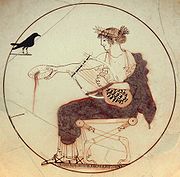
Ancient Greece
Ancient Greece is a civilization belonging to a period of Greek history that lasted from the Archaic period of the 8th to 6th centuries BC to the end of antiquity. Immediately following this period was the beginning of the Early Middle Ages and the Byzantine era. Included in Ancient Greece is the...
was almost universally present in society, from marriages and funerals to religious ceremonies, theatre
Theatre of Ancient Greece
The theatre of Ancient Greece, or ancient Greek drama, is a theatrical culture that flourished in ancient Greece between c. 550 and c. 220 BC. The city-state of Athens, which became a significant cultural, political and military power during this period, was its centre, where it was...
, folk music and the ballad-like reciting of epic poetry. It thus played an integral role in the lives of ancient Greeks
Greeks
The Greeks, also known as the Hellenes , are a nation and ethnic group native to Greece, Cyprus and neighboring regions. They also form a significant diaspora, with Greek communities established around the world....
. There are significant fragments of actual Greek musical notation as well as many literary references to ancient Greek music, such that some things can be known—or reasonably surmised—about what the music sounded like, the general role of music in society, the economics of music, the importance of a professional caste of musicians, etc. Even archaeological remains reveal an abundance of depictions on ceramics, for example, of music being performed. The word music comes from the Muses, the daughters of Zeus
Zeus
In the ancient Greek religion, Zeus was the "Father of Gods and men" who ruled the Olympians of Mount Olympus as a father ruled the family. He was the god of sky and thunder in Greek mythology. His Roman counterpart is Jupiter and his Etruscan counterpart is Tinia.Zeus was the child of Cronus...
and patron goddesses of creative and intellectual endeavours.
The difference between music and philosophy
.jpg)
Musica universalis
Musica universalis is an ancient philosophical concept that regards proportions in the movements of celestial bodies—the Sun, Moon, and planets—as a form of musica . This 'music' is not usually thought to be literally audible, but a harmonic and/or mathematical and/or religious concept...
" and read of Pythagoras
Pythagoras
Pythagoras of Samos was an Ionian Greek philosopher, mathematician, and founder of the religious movement called Pythagoreanism. Most of the information about Pythagoras was written down centuries after he lived, so very little reliable information is known about him...
and his school, who laid the foundations of our knowledge of the study of harmonics—how strings and columns of air vibrate, how they produce overtones, how the overtones are related arithmetically to one another, etc.
It is important to note that the entire study of such things by the Greeks was less a formula for the production of playable music than it was a mathematical and philosophical description of how the universe, in general, was perceived to be constructed—the stars, the sun, the planets, all vibrating in harmony.
What the music sounded like
At a certain point, PlatoPlato
Plato , was a Classical Greek philosopher, mathematician, student of Socrates, writer of philosophical dialogues, and founder of the Academy in Athens, the first institution of higher learning in the Western world. Along with his mentor, Socrates, and his student, Aristotle, Plato helped to lay the...
complained about the new music:
Our music was once divided into its proper forms...It was not permitted to exchange the melodic styles of these established forms and others. Knowledge and informed judgment penalized disobedience. There were no whistles, unmusical mob-noises, or clapping for applause. The rule was to listen silently and learn; boys, teachers, and the crowd were kept in order by threat of the stick. . . . But later, an unmusical anarchy was led by poets who had natural talent, but were ignorant of the laws of music...Through foolishness they deceived themselves into thinking that there was no right or wrong way in music, that it was to be judged good or bad by the pleasure it gave. By their works and their theories they infected the masses with the presumption to think themselves adequate judges. So our theatres, once silent, grew vocal, and aristocracy of music gave way to a pernicious theatrocracy...the criterion was not music, but a reputation for promiscuous cleverness and a spirit of law-breaking.
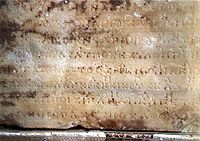
Playing what "sounded good" violated the established ethos
Ethos
Ethos is a Greek word meaning "character" that is used to describe the guiding beliefs or ideals that characterize a community, nation, or ideology. The Greeks also used this word to refer to the power of music to influence its hearer's emotions, behaviors, and even morals. Early Greek stories of...
of modes that the Greeks had developed by the time of Plato: a complex system of relating certain emotional and spiritual characteristics to certain modes (scales). The names for the various modes derived from the names of Greek tribes and peoples, the temperament and emotions of which were said to be characterized by the unique sound of each mode. Thus, Dorian modes were "harsh", Phrygian modes "sensual", and so forth. In his Republic, Plato talks about the proper use of various modes, the Dorian, Phrygian, Lydian, etc. It is difficult for the modern listener to relate to that concept of ethos in music except by comparing our own perceptions that a minor scale is used for melancholy and a major scale for virtually everything else, from happy to heroic music. (Today, one might look at the system of scales known as raga
Raga
A raga is one of the melodic modes used in Indian classical music.It is a series of five or more musical notes upon which a melody is made...
s in India for a better comparison, a system that prescribes certain scales for the morning, others for the evening, and so on.)
The sounds of scales vary depending on the placement of tones
Pitch (music)
Pitch is an auditory perceptual property that allows the ordering of sounds on a frequency-related scale.Pitches are compared as "higher" and "lower" in the sense associated with musical melodies,...
. Modern Western scales use the placement of whole tones, such as C to D on a modern piano keyboard, and half tones, such as C to C-sharp, but not quarter-tones ("in the cracks" on a modern keyboard) at all. This limit on tone types creates relatively few kinds of scales in modern Western music compared to that of the Greeks, who used the placement of whole-tones, half-tones, and even quarter-tones (or still smaller intervals) to develop a large repertoire of scales, each with a unique ethos. The Greek concepts of scales (including the names) found its way into later Roman music and then the European Middle Ages to the extent that one can find references to, for example, a "Lydian church mode", although name is simply a historical reference with no relationship to the original Greek sound or ethos.

Plato
Plato , was a Classical Greek philosopher, mathematician, student of Socrates, writer of philosophical dialogues, and founder of the Academy in Athens, the first institution of higher learning in the Western world. Along with his mentor, Socrates, and his student, Aristotle, Plato helped to lay the...
, Aristoxenus
Aristoxenus
Aristoxenus of Tarentum was a Greek Peripatetic philosopher, and a pupil of Aristotle. Most of his writings, which dealt with philosophy, ethics and music, have been lost, but one musical treatise, Elements of Harmony, survives incomplete, as well as some fragments concerning rhythm and...
and, later, Boethius
Anicius Manlius Severinus Boethius
Anicius Manlius Severinus Boëthius, commonly called Boethius was a philosopher of the early 6th century. He was born in Rome to an ancient and important family which included emperors Petronius Maximus and Olybrius and many consuls. His father, Flavius Manlius Boethius, was consul in 487 after...
, we can say with some caution that the ancient Greeks, at least before Plato, heard music that was primarily monophonic; that is, music built on single melodies based on a system of modes/scales, themselves built on the concept that notes should be placed between consonant intervals. It is a commonplace of musicology to say that harmony, in the sense of a developed system of composition, in which many tones at once contribute to the listener's expectation of resolution, was invented in the European Middle Ages and that ancient cultures had no developed system of harmony—that is, for example, playing the third and seventh above the dominant, in order to create the expectation for the listener that the tritone will resolve to the third.
Yet, it is obvious from the following excerpt from Plato's Republic that Greek musicians sometimes played more than one note at a time, although this was apparently considered an advanced technique. The Orestes fragment of Euripides seems to clearly call for more than one note to be sounded at once.. There is also intriguing research in the field of music from the ancient Mediterranean—decipherings of cuneiform music script—that argue for the sounding of different pitches simultaneously and for the theoretical recognition of a "scale" many centuries before the Greeks learned to write, which of course would have been before they developed their system for notating music and recorded the written evidence for simultaneous tones. All we can say from the available evidence is that, while Greek musicians clearly employed the technique of sounding more than one note at the same time, the most basic, common texture of Greek music was monophonic.
That much seems evident from another passage from Plato:
...The lyre should be used together with the voices...the player and the pupil producing note for note in unison, HeterophonyHeterophonyIn music, heterophony is a type of texture characterized by the simultaneous variation of a single melodic line. Such a texture can be regarded as a kind of complex monophony in which there is only one basic melody, but realized at the same time in multiple voices, each of which plays the melody...
and embroidery by the lyre--the strings throwing out melodic lines different from the melodia which the poet composed; crowded notes where his are sparse, quick time to his slow...and similarly all sorts of rhythmic complications against the voices--none of this should be imposed upon pupils...
Music in society
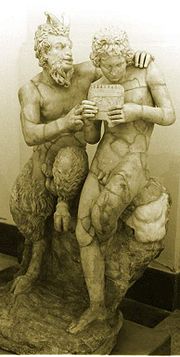

Amphion
There are several characters named Amphion in Greek mythology:* Amphion, son of Zeus and Antiope, and twin brother of Zethus . Together they are famous for building Thebes. Amphion married Niobe, and killed himself after the loss of his wife and children at the hands of Apollo and Artemis...
learned music from Hermes
Hermes
Hermes is the great messenger of the gods in Greek mythology and a guide to the Underworld. Hermes was born on Mount Kyllini in Arcadia. An Olympian god, he is also the patron of boundaries and of the travelers who cross them, of shepherds and cowherds, of the cunning of thieves, of orators and...
and then with a golden lyre built Thebes by moving the stones into place with the sound of his playing; Orpheus
Orpheus
Orpheus was a legendary musician, poet, and prophet in ancient Greek religion and myth. The major stories about him are centered on his ability to charm all living things and even stones with his music; his attempt to retrieve his wife from the underworld; and his death at the hands of those who...
, the master-musician and lyre-player, played so magically that he could soothe wild beasts; the Orphic creation myths have Rhea "playing on a brazen drum, and compelling man's attention to the oracles of the goddess"; or Hermes [showing to Apollo] "...his newly-invented tortoise-shell lyre and [playing] such a ravishing tune on it with the plectrum he had also invented, at the same time singing to praise Apollo's nobility that he was forgiven at once..."; or Apollo's musical victories over Marsyas
Marsyas
In Greek mythology, the satyr Marsyas is a central figure in two stories involving music: in one, he picked up the double flute that had been abandoned by Athena and played it; in the other, he challenged Apollo to a contest of music and lost his hide and life...
and Pan
Pan (mythology)
Pan , in Greek religion and mythology, is the god of the wild, shepherds and flocks, nature, of mountain wilds, hunting and rustic music, as well as the companion of the nymphs. His name originates within the Greek language, from the word paein , meaning "to pasture." He has the hindquarters, legs,...
.
There are many such references that indicate that music was an integral part of the Greek perception of how their race had even come into existence and how their destinies continued to be watched over and controlled by the Gods. It is no wonder, then, that music was omnipresent at the Pythian Games
Pythian Games
The Pythian Games were one of the four Panhellenic Games of Ancient Greece, a forerunner of the modern Olympic Games, held every four years at the sanctuary of Apollo at Delphi....
, the Olympic Games
Olympic Games
The Olympic Games is a major international event featuring summer and winter sports, in which thousands of athletes participate in a variety of competitions. The Olympic Games have come to be regarded as the world’s foremost sports competition where more than 200 nations participate...
, religious ceremonies, leisure activities, and even the beginnings of drama as an outgrowth of the dithyramb
Dithyramb
The dithyramb was an ancient Greek hymn sung and danced in honour of Dionysus, the god of wine and fertility; the term was also used as an epithet of the god: Plato, in The Laws, while discussing various kinds of music mentions "the birth of Dionysos, called, I think, the dithyramb." Plato also...
s performed in honor of Dionysus
Dionysus
Dionysus was the god of the grape harvest, winemaking and wine, of ritual madness and ecstasy in Greek mythology. His name in Linear B tablets shows he was worshipped from c. 1500—1100 BC by Mycenean Greeks: other traces of Dionysian-type cult have been found in ancient Minoan Crete...
.
It may be that the actual sounds of the music heard at rituals, games, dramas, etc. underwent a change after the traumatic fall of Athens
Athens
Athens , is the capital and largest city of Greece. Athens dominates the Attica region and is one of the world's oldest cities, as its recorded history spans around 3,400 years. Classical Athens was a powerful city-state...
in 404 b.c. at the end of the first Peloponnesian War
Peloponnesian War
The Peloponnesian War, 431 to 404 BC, was an ancient Greek war fought by Athens and its empire against the Peloponnesian League led by Sparta. Historians have traditionally divided the war into three phases...
. Indeed, one reads of the "revolution" in Greek culture, and Plato's lament that the new music "...used high musical talent, showmanship and virtuosity...consciously rejecting educated standards of judgement." Although instrumental virtuosity was prized, this complaint included excessive attention to instrumental music such as to interfere with accompanying the human voice, and the falling away from the traditional ethos in music.
Greek musical instruments
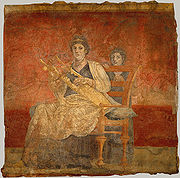

Hornbostel-Sachs
Hornbostel–Sachs is a system of musical instrument classification devised by Erich Moritz von Hornbostel and Curt Sachs, and first published in the Zeitschrift für Ethnologie in 1914. An English translation was published in the Galpin Society Journal in 1961...
.) Within this system, strings may be struck (ex: piano), bowed (violin) or plucked (guitar). Wind instruments may be single mechanical reed (clarinet) or double mechanical reed (oboe); also, wind instruments may be lip reed (trumpet), air reed (flute), vocal-cord reed (voice) and tuned, free reed (accordion). Percussion instruments may produce either a definite pitch (bell) or an indefinite pitch (bass drum). The following were among the instruments used in the music of ancient Greece:
- the lyreLyreThe lyre is a stringed musical instrument known for its use in Greek classical antiquity and later. The word comes from the Greek "λύρα" and the earliest reference to the word is the Mycenaean Greek ru-ra-ta-e, meaning "lyrists", written in Linear B syllabic script...
: a strummed and occasionally plucked string instrumentPlucked string instrumentPlucked string instruments are a subcategory of string instruments that are played by plucking the strings. Plucking is a way of pulling and releasing the string in such as way as to give it an impulse that causes the string to vibrate...
, essentially a hand-held zitherZitherThe zither is a musical string instrument, most commonly found in Slovenia, Austria, Hungary citera, northwestern Croatia, the southern regions of Germany, alpine Europe and East Asian cultures, including China...
built on a tortoise-shell frame, generally with seven or more strings tuned to the notes of one of the modes. The lyre was used to accompany others or even oneself for recitation and song.
- the kitharaKitharaThe kithara or cithara was an ancient Greek musical instrument in the lyre or lyra family. In modern Greek the word kithara has come to mean "guitar" ....
, also a strummed string instrument, more complicated than the lyreLyreThe lyre is a stringed musical instrument known for its use in Greek classical antiquity and later. The word comes from the Greek "λύρα" and the earliest reference to the word is the Mycenaean Greek ru-ra-ta-e, meaning "lyrists", written in Linear B syllabic script...
. It had a box-type frame with strings stretched from the cross-bar at the top to the sounding box at the bottom; it was held upright and played with a plectrumPlectrumA plectrum is a small flat tool used to pluck or strum a stringed instrument. For hand-held instruments such as guitars and mandolins, the plectrum is often called a pick, and is a separate tool held in the player's hand...
. The strings were tunable by adjusting wooden wedges along the cross-bar.
- the aulosAulosAn aulos or tibia was an ancient Greek wind instrument, depicted often in art and also attested by archaeology.An aulete was the musician who performed on an aulos...
, usually double, consisting of two double-reed (like an oboe) pipes, not joined but generally played with a mouth-band to hold both pipes steadily between the player's lips. Modern reconstructions indicate that they produced a low, clarinet-like sound. There is some confusion about the exact nature of the instrument; alternate descriptions indicate single-reeds instead of double reeds.
- the Pan pipes, also known as panflute and syrinxSyrinxIn classical mythology, Syrinx was a nymph and a follower of Artemis, known for her chastity. Pursued by the amorous Greek god Pan, she ran to the river's edge and asked for assistance from the river nymphs. In answer, she was transformed into hollow water reeds that made a haunting sound when...
(Greek συριγξ), (so-called for the nymph who was changed into a reed in order to hide from PanPan (mythology)Pan , in Greek religion and mythology, is the god of the wild, shepherds and flocks, nature, of mountain wilds, hunting and rustic music, as well as the companion of the nymphs. His name originates within the Greek language, from the word paein , meaning "to pasture." He has the hindquarters, legs,...
) is an ancient musical instrument based on the principle of the stopped pipe, consisting of a series of such pipes of gradually increasing length, tuned (by cutting) to a desired scale. Sound is produced by blowing across the top of the open pipe (like blowing across a bottle top).
- the hydraulis, a keyboard instrument, the forerunner of the modern organ. As the name indicates, the instrument used water to supply a constant flow of pressure to the pipes. Two detailed descriptions have survived: that of Vitruvius and Heron of Alexandria. These descriptions deal primarily with the keyboard mechanism and with the device by which the instrument was supplied with air. A well-preserved model in pottery was found at Carthage in 1885. Essentially, the air to the pipes that produce the sound comes from a wind-chest connected by a pipe to a dome; air is pumped in to compress water, and the water rises in the dome, compressing the air, and causing a steady supply of air to the pipes.
In the Aeneid
Aeneid
The Aeneid is a Latin epic poem, written by Virgil between 29 and 19 BC, that tells the legendary story of Aeneas, a Trojan who travelled to Italy, where he became the ancestor of the Romans. It is composed of roughly 10,000 lines in dactylic hexameter...
, Virgil makes numerous references to the trumpet, most notably having to do with Aeneas' comrade, Misenus:
We can assume that the Greeks and Trojans of whom Virgil speaks made use not only of the conch — a sea shell with a cut opening as a mouthpiece — but even of the brass trumpet ("...With breathing brass to kindle fierce alarms...") or salpinx. A number of sources mention this metal instrument (with a bone mouthpiece) and they appear in vase paintings.
The lyre, kithara, aulos, hydraulis and trumpet all found their way into the music of ancient Rome
Ancient Roman music
Less is known about Ancient Roman music than is known about the music of ancient Greece. There is a number of at least partially extant sources on the music of the Greeks...
.
Classical Period
- Eleusis inv. 907 (trumpet signal)
- Dionysius of HalicarnassusDionysius of HalicarnassusDionysius of Halicarnassus was a Greek historian and teacher of rhetoric, who flourished during the reign of Caesar Augustus. His literary style was Attistic — imitating Classical Attic Greek in its prime.-Life:...
, Comp. 63 f. - EuripidesEuripidesEuripides was one of the three great tragedians of classical Athens, the other two being Aeschylus and Sophocles. Some ancient scholars attributed ninety-five plays to him but according to the Suda it was ninety-two at most...
, OrestesOrestesOrestes was the son of Agamemnon in Greek mythology; Orestes may also refer to:Drama*Orestes , by Euripides*Orestes, the character in Sophocles' tragedy Electra*Orestes, the character in Aeschylus' trilogy of tragedies, Oresteia...
, Papyrus Vienna G 2315 - Papyrus Leiden inv. P. 510 (Euripides, Iphigenia in Aulis)
Hellenistic Period
- Papyrus Ashm. inv. 89B/31, 33
- Papyrus Ashm. inv. 89B/29-32 (citharodic nomes)
- Papyrus Hibeh 231
- Papyrus Zeno 59533
- Papyrus Vienna G 29825 a/b recto
- Papyrus Vienna G 29825 a/b verso
- Papyrus Vienna G 29825 c
- Papyrus Vienna G 29825 d-f
- Papyrus Vienna G 13763/1494
- Papyrus Berlin 6870
- Epidaurus, SEG 30. 390 (Hymn to Asclepius)
See also
- Delphic HymnsDelphic HymnsThe Delphic Hymns are two musical compositions from Ancient Greece, which survive in substantial fragments. They were long regarded as being dated circa 138 BCE and 128 BCE, respectively, but recent scholarship has shown it likely they were both written for performance at the Athenian...
- Oxyrhynchus hymnOxyrhynchus hymnThe Oxyrhynchus hymn is the earliest known manuscript of a Christian hymn to contain both lyrics and musical notation. It is found on Papyrus 1786 of the Oxyrhynchus papyri, now kept at the Papyrology Rooms of the Sackler Library, Oxford. This papyrus fragment was unearthed in 1918 and the...
- Ancient Roman musicAncient Roman musicLess is known about Ancient Roman music than is known about the music of ancient Greece. There is a number of at least partially extant sources on the music of the Greeks...
- For a technical discussion, Musical system of ancient GreeceMusical system of ancient greeceThis article concerns itself with the music theoretical and mathematical tone system of ancient Greece. For a discussion of the cultural aspects and history of ancient Greek music, see Music of ancient Greece....
Further reading
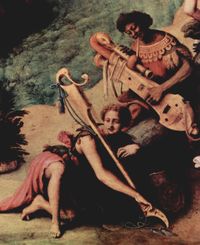
- Anderson, Warren D. (1966). Ethos and Education in Greek Music: The Evidence of Poetry and Philosophy. Cambridge, Mass.: Harvard University Press.
- Anderson, Warren D. (1994). Music and Musicians in Ancient Greece. Ithaca and London: Cornell University Press. ISBN 0801430836 (cloth); ISBN 0801430305 (pbk).
- Barker, Andrew (ed.) (1984–89). Greek Musical Writings, 2 vols. Cambridge Readings in the Literature of Music. Cambridge: Cambridge University Press. Limited preview of vol. 1 online.
- Comotti, Giovanni. (1989). Music in Greek and Roman Culture. Baltimore: Johns Hopkins University Press. ISBN 0801833647.
- Hagel, Stefan. (2009). Ancient Greek Music: A New Technical History. Cambridge and New York: Cambridge University Press. ISBN 9780521517645.
- Landels, John G. (1999). Music in Ancient Greece and Rome. London and New York: Routledge. ISBN 0415167760 (cloth); ISBN 0415248434 (pbk reprint, 2001). Limited preview online.
- Lord, Albert B. (1960). The Singer of Tales. Cambridge: Harvard University Press.
- Maas, Martha, and Jane McIntosh Snyder (1989) Stringed Instruments of Ancient Greece. New Haven: Yale University Press. ISBN 0300036868. Limited preview online.
- Mathiesen, Thomas J. (1999). Apollo's Lyre: Greek Music and Music Theory in Antiquity and the Middle Ages. Lincoln, NE: University of Nebraska Press. Limited preview online.
- Mathiesen, Thomas J. (1974). Bibliography of Sources for the Study of Ancient Greek Music. New Jersey: Joseph Boonin, Inc.
- Michaelides, S. (1978) The Music of Ancient Greece: An Encyclopaedia. London: Faber & Faber.
- Monro, David Binning (1894). The Modes of Ancient Greek Music. Oxford: Clarendon Press. Republished as an unabridged facsimile by Elibron, limited preview online.
- Murray, Penelope, and Peter Wilson (eds.) (2004). Music and the Muses: The Culture of 'Mousike' in the Classical Athenian City. Oxford and New York: Oxford University Press. ISBN 0199242399. Limited preview online.
- Pöhlmann, Egert, and Martin L. West (2001). Documents of Ancient Greek Music: The Extant Melodies and Fragments Edited and Transcribed with Commentary. Oxford: Clarendon Press. ISBN 0-19-815223-X.
- Sachs, Curt. (1943). The Rise of Music in the Ancient World. NY: W.W. Norton & Company, Inc.
- Webster, T. B. L. (1970). The Greek Chorus. London: Methuen anc Co. Ltd. ISBN 0416163505.
- West, Martin L. (1992) Ancient Greek Music. Oxford, OUP. Limited preview online.
- Winnington-Ingram, R. P. (1968). Mode in Ancient Greek Music. Amsterdam: Adolf M. Hakkert.
External links
- Ensemble Musica Romana. Ensemble for ancient music: reconstructed Instruments, Concerts, CDs and lectures. They play f.e. a reconstructed water-organ.
- Ensemble Kérylos, dir. Annie Bélis, who has reconstructed ancient instruments from her archæological works. This group has recorded a CD, available on his website
- Ancient Greek music at the Austrian Academy of Sciences. Audio-edition of the published fragments; reconstructed instruments played.
- Daimonia Nymphe: group playing new compositions on Ancient Greek instruments
- A modern reconstruction of an ancient hydraulis.
- Ancient Greek scores from IMSLP

